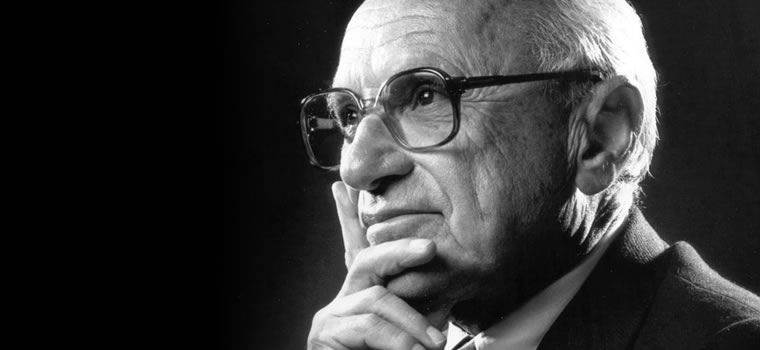Found an interesting blog post from a Canadian economics blog: There are no Friedmans today, except maybe Friedman himself. The basic point is simple: “The right won the economics debate; left and right are just haggling over details.” Of course, you wouldn’t know that from most economics debates. The world has a funny habit of forgetting when conservatives win major debates. Everyone is well aware that evolution beat out any and all opposing theories. Few remember that the Big Bang Theory was seen as a controversial, conservative-aligned view before it was thoroughly validated. Same basic notion here: everyone wants to give credit to Keynes but forgets:
The way that New Keynesians approach macroeconomics owes more to Friedman than to Keynes: the permanent income hypothesis; the expectations-augmented Phillips Curve; the idea that the central bank is responsible for inflation and should follow a transparent rule. The first two Friedman invented; the third pre-dates Friedman, but he persuaded us it was right.
And one more quote to show how far we’ve come:
We easily forget how daft the 1970’s really were, and some ideas were much worse than pet rocks. (Marxism was by far the worst, of course, and had a lot of support amongst university intellectuals, though not much in economics departments.) When inflation was too high, and we wanted to bring inflation down, many (most?) macroeconomists advocated direct controls on prices and wages. And governments in Canada, the US, the UK (there must have been more) actually implemented direct controls on prices and wages to bring inflation down. Milton Friedman actually had to argue against price and wage controls and against the prevailing wisdom that inflation was caused by monopoly power, monopoly unions, a grab-bag of sociological factors, and had nothing to do with monetary policy.
Imagine if I argued today: “Inflation is dangerously low. In order to increase inflation, governments should pass a law saying that all firms must raise all prices and wages by a minimum of 2% a year, unless they apply for and get special permission from the Prices and Incomes Board to raise them by less.” What are the chances my policy proposal would be accepted?
Friedman had a mountain to move, and he moved it. And because he already moved it, we simply cannot have a Friedman today.
Oh well. I guess sometimes it’s more important to win than get the credit.

I wonder whether this is related to the current partisan breakdown, in which Democrats generally do better than Republicans among their respective bases by appearing to have compromised. The ACA seems like an extreme example; the left was trying desperately to get the right to acknowledge that it was their idea. But it seems like there is a general trend in which liberals are fairly comfortable seeing their politicians adapt the means of conservatives to liberal ends, while conservatives generally see both the means and the ends of liberals as severely problematic.
Does that seem at all plausible to you?
I think the reason conservatives seem less accommodating is simply a consequence of being marginalized. It’s easy to be generous when you are, more or less, in control. And liberalism is–from the standpoint of the national conversation–quite firmly in control. Which is why it waxes poetic about tolerance and compromise.
I do not feel, however, that in practical application there is much significant difference between D and R when it comes to living these principles out.